
De-romanticising the market.pptx
- 1. DE-ROMANTICISING THE MARKET: ADVANCES IN CONSUMER CULTURE THEORY James Fitchett & James Cronin (2022) De-romanticising the market: advances in Consumer CultureTheory, Journal of Marketing Management, 38:1-2, 1-16, DOI: 10.1080/0267257X.2022.2045126 To link to this article: https://doi.org/10.1080/0267257X.2022.2045126
- 2. THREE ISSUES/PROBLEMS POSED BYTHE AUTHOR (WHYTHE RESEARCHWAS CONDUCTED) The study is conducted to reflect on whether the lexicon, frameworks, and conceptual blueprints of CCT remain relevant for thinking beyond the marketplace and appreciating social life “as it is” without interjecting it with market-centric language and assumptions. The research De-Romanticising the market: Advances in Consumer Culture Theory was conducted to re evaluate, retool and re imagine the concept of CCT and to depart from anti- consumption and anti-branding micro-practices within small-scale cultural milieu and consider instead more systemic forms of resistance and how multi-actor, anti-conformist market logics can emerge through mass, enduring collective protest. The study denaturalises and departs from an exclusive focus on consumption alone to reveal the important dialectic interactions between constructs such as occupation and commerce.
- 3. METHODOLOGY USED The research used qualitative methodologies such as interviews, case studies, ethnographic, as well as 'netnographic' methodswhich are well adapted to study the experiential, sociological and cultural aspects of consumption,
- 4. CONCLUSIONS Marketplace can be integrated with and presented as a collective political force to: challenge economic determinism, protest regressive infringements on civic liberty, and foster localized, informal more-than-market networks. The origins of CCT as a multidisciplinary project – and one that should be willing to question and even reject some of the apparently natural assumptions of the marketing department and the business school – continues to produce schisms within the field. To put consumption, consumer culture, and capitalism in their appropriate cultural context, and from there we might be able to imagine alternative cultural fantasies. Needs, desires, the consumer subject, commodities, exchange or whatever are ‘relative’ misses the point that they are nevertheless culturally coherent, and therefore any visions for the future of consumer culture(s) must also work within this coherence. Consumer culture(s) have the capacity to be endlessly and frustratingly mesmerising in their insatiable ability to occupy and colonise any and all aspects of lived experience for the purposes of accumulation.
- 5. RECOMMENDATIONS Understanding those interactions necessitates thinking not just of the consumer subject but of other intersecting subjectivities and stakeholders including citizens, metropolitans, business owners, tourists, government decision-makers, and state authorities (police enforcement).
